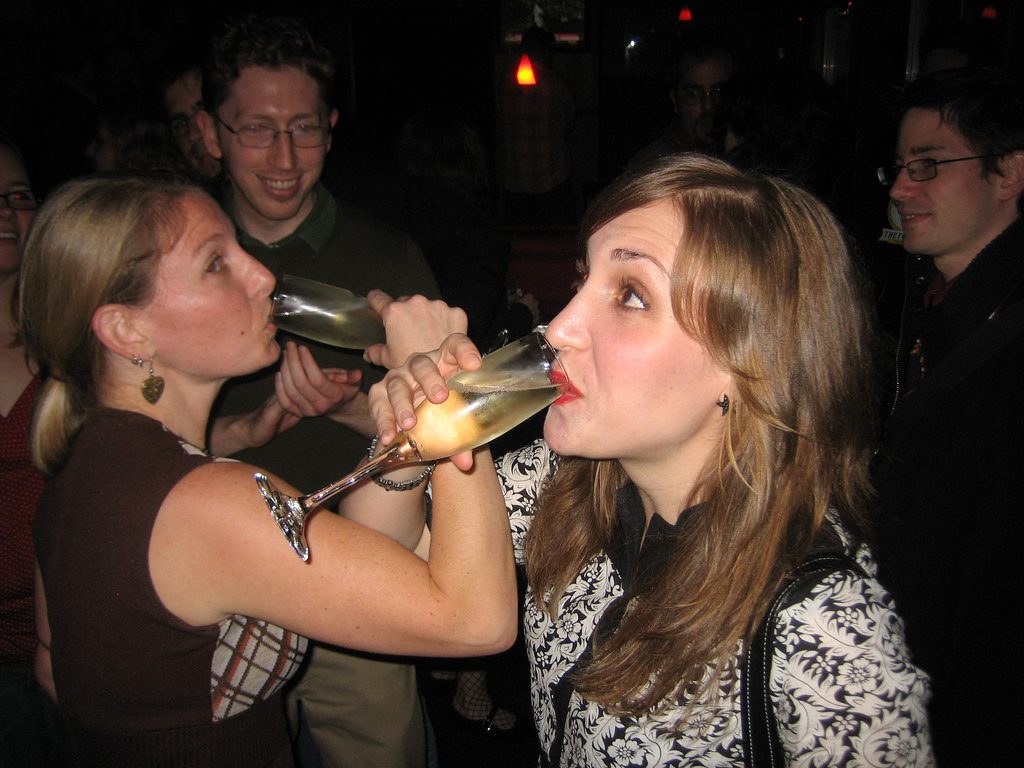3 Russian Drinking Traditions You May Not Know About Posted by Maria on Oct 26, 2017 in Culture, when in Russia
Drinking alcohol is one of the first associations many people have with Russia (whether rightly or not). However, the drinking culture may be different from other countries. In today’s post, we will look at three alcohol-related behavio(u)rs specific to Russia.
Drinking Gesture
Covered in our overview of popular Russian gestures, a flick or tap on the side of your neck (with you index and/or middle finger) is the Russian gesture for drinking, being drunk, or an invitation to drink. According to one version, this gesture originated when tsar Peter I wanted to reward a man who had repaired a cathedral spire. The man’s reward was being able to get free drinks wherever he went, but he kept losing the document stating that right, so eventually his neck was branded so he could just point to the brand to be served.
Food Chasers
When it comes to having liquor straight (what would be called “shots” in English), traditionally Russians have certain food items handy to bite into right after drinking. These foods are called закуска (this word can also mean “snack” or “appetizer”). This word is related to кусать (to bite) and вкус (taste). Typical “chasers” include pickles (солёный огурец) and brown bread (чёрный хлеб). Sometimes drinks will be served with the закуска placed on top of the glass.
Brotherly Love
The expression пить на брудершафт comes from the German Brüderschaft trinken, “drink to brotherhood.” Брудершафт refers to a drinking rituals where two people who want to be on a first-name basis face each other, interlock their right arms, and drink a full glass, usually of wine. This may be followed by a kiss. This ritual possibly evolved from a medieval custom.
After doing this, the two people are supposed to address each other in the informal (ты). There are examples of this in literature, for instance in the famous The Master and Margarita:
Кота́м обы́чно почему́-то говоря́т «ты», хотя́ ни оди́н кот никогда́ ни с кем не пил брудерша́фта.
[For some reason, cats are usually addressed by their first names although no cat ever drank to brotherhood with anyone.]

Build vocabulary, practice pronunciation, and more with Transparent Language Online. Available anytime, anywhere, on any device.







Comments:
samonen:
The history behind the neck tapping gesture–whether it be a historical fact or folklore– made me go “wow!”: one of those things that make things Russian so fascinating to the point of absurd perplexity. I mean come on! Getting branded in the neck as a reward?
Many people–including myself–seem to think of закуски as hors d’oeuvres (or ‘antipasti’ in the Italian tradition or something alike in other traditions): some sort of nibbles that come before the actual meal. I guess the bottom line is that you should always have a bite to eat with your vodka unless you’re a drunkard. (And NEVER dilute your vodka–straight up, folks! )
Брудершафт (Bruderschaft drinken) is familiar to me but it was very interesting to know this German tradition (and word) is alive and well in Russia.
I happened to watch a German whodunit the other day where the detective asked someone to simulate a behavior: he asked someone to raise the glass, drink it up, and, when the glass was empty, “auf russisch” (по-русски, à la russe): the person threw the glass over his shoulder smashing it. Is this really a Russian tradition?
Thank you for the post, Maria. Great job!
Maria:
@samonen Thank you, Samonen! Ha, I’ve never actually observed the smashing of the glass, but it seems to be in line with the over-the-top passionate image of themselves some Russians like to present. 🙂